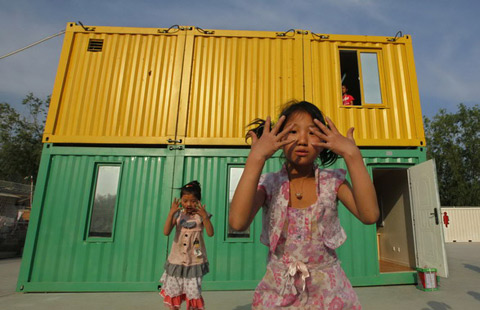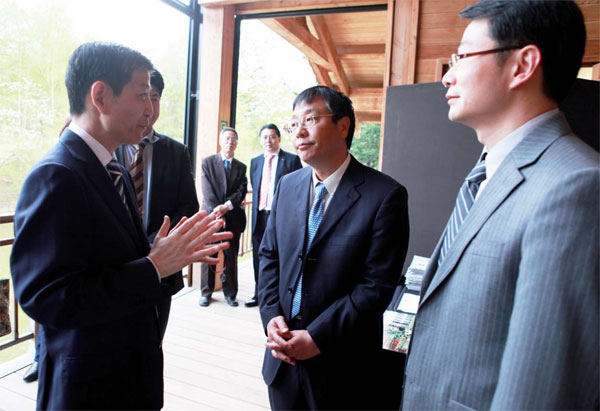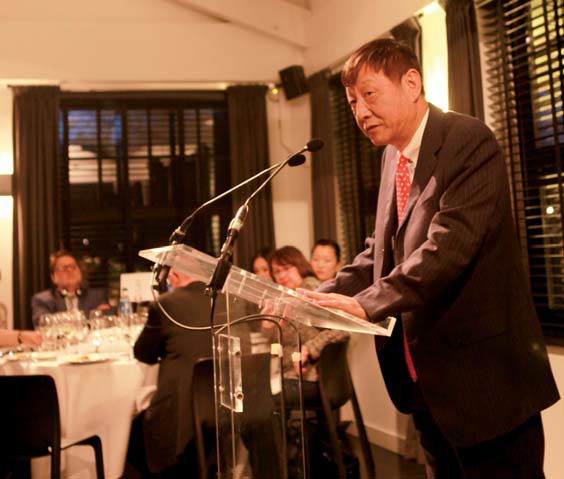Market reforms to shape China: expert
Updated: 2014-04-04 08:01
By Tuo Yannan and Fu Jing (China Daily Europe)
|
|||||||||||
|
China's ambassador to Belgium Liao Liqiang (left) and Kang Bing (Center), deputy editor-in-chief of China Daily, and Ji Tao, assistant editor-in-chief of China Daily, exchange pleasantaries before the seminar. Tuo Yannan / China Daily |
|
Cao Yuanzheng, chief economist of Bank of China International Holdings, speaks during the dinner debate. Fu Jing / China Daily |
Debate in Brussels following Xi Jinping's visit looks at country's economic future
The Chinese government's decision to "enable the market to play a decisive role in allocating resources" will not only dictate the country's economic growth over the next 5 to 10 years but will also determine what shape it takes as a modern market economy, a Chinese think tank leader says.
The process now in train involves "not just reforming the economic system but also creating mechanisms to drive comprehensive reform", said Chi Fulin, president of the China Institute of Development and Reform.
He was speaking at a speech and dinner event in Brussels on April 2 organized by China Daily titled "China's Deep Reform and Development Direction".
The seminar was held a day after President Xi Jinping ended an 11-day visit to the Netherlands, France, Germany and Belgium. The Brussels event followed a two-day international seminar on China's reform and its global implications held at the College of Europe in Bruges at which Xi delivered a speech.
Xi's visit transmitted many positive signals for China's relationship with Belgium and Europe, Liao Liqiang, China's ambassador to Belgium, said at the Brussels event.
This included Xi's visit to two pandas at a zoo 60 kilometers from Brussels, the first time a president and a king have come together for the opening of a pavilion holding Chinese giant pandas, he said.
Chi said China's deepening of comprehensive reforms will propel the country's economy.
Measures adopted by the Third Plenary Session of the 18th Central Committee of the Chinese Communist Party late last year referred to developing the socialist system with Chinese characteristics, Chi said. The measures stipulated that the main purpose of pressing ahead with reform was to modernize the way government is run and at the same time give government the tools to do its job, he said.
"The 60-article decision lists 336 reform tasks in various fields such as economy, politics, culture, society and ecological civilization."
The measures reflect not only the determination and courage of China's new leadership to push ahead with reform, Chi said, but also that care will be paid to ensure the changes are not only comprehensive but also well organized.
"There is no doubt changing the economic system to enable the market to play a decisive role is the priority in deepening reform."
China's advantage over other economies is that it has 1.3 billion consumers, but it is difficult to translate that potential into a real force for economic growth because of the country's government-led economic growth model, he said.
Chi also referred to streamlining government administration and delegating more power to lower-level governments. Letting the market play a "decisive role" does not mean that there is no role for government, he said. Rather, it requires a more capable, effective, well-functioning and responsible government that respects the laws of the market.
"Now China's new-generation government has decided to focus on streamlining administration and delegating more power to lower tiers of government, we can expect important breakthroughs in further streamlining the relationship between the government and the market over the next few years."
By 2020, China's annual household consumption will be worth between 45 trillion yuan (7.3 trillion dollars; 5.3 trillion euros) and 50 trillion yuan, he said, and total domestic demand in China is expected to reach about 100 trillion yuan.
"This is a large enough driver for China's economy to grow by 7-8 percent in the next 10 years," he said. Over the coming 3-5 years, reform is expected to continuously stimulate economic vitality, he said.
Cao Yuanzheng, chief economist of Bank of China International Holdings, said that in the past two years the country had been at a the turning point and reform had become rapid.
The yuan has become the second largest currency after the US dollar globally, he said, and people would soon be able to use the yuan to do business anywhere in the world.
"In three years the yuan will be basically convertible."
If foreign investors could use the yuan to invest in China it would boost China's international trade, he said.
At the Brussels event Cao and Chang Xiuze, senior professor of the Institute of Macroeconomics under the National Development and Reform Commission, said China's economic reforms will build a very powerful market, and overseas investors will put a lot of money into medical care, insurance, urbanization and culture.
"We should spend more time on communication," Chang said. "There is a real benefit for Europe and China in investments, for businesses to enter the Chinese market."
If China pressed on with its economic reform, Europe would soon recognize it as a market-based economy, he said.
Ludo Van Campenhout, vice-mayor of Antwerp, said reform is very important. Xi's visit to Belgium had been a huge honor for the country, he said.
At the dinner debate, tribute was also paid to the late Belgian businessman Henri Lederhandler who died on Dec 24.
"President Xi has spoken of Henri Lederhandler, a long-time friend who visited China more than 70 times, and built a bridge for China-EU friendship," Liao Liqiang, the ambassador, said.
"Without such people, we would not enjoy the fruitful and promising relations with European countries that now exist."
Bernard Dewit, chairman of the Belgian-Chinese Chamber of Commerce, who worked with Lederhandler for many years, said the good relationships would stimulate the China-EU relationship at all levels.
Other guests at the dinner included Stahl Gerhard, chairman of the Committee of Regions of the European Union; Ludo Van Campenhout, vice-mayor of Antwerp; Li Xuan, secretary-general of the International Wine and Spirits Museum; and Peng Xiancheng, president of Sichuan Decision Chemical.
Li Xiaofei contributed to this story.
Contact the writers through tuoyannan@chinadaily.com.cn.
(China Daily European Weekly 04/04/2014 page23)
Today's Top News
Chinese ships continue hunt for MH370 signals
Xinjiang vows to stop extremism
Australia also detects suspicious pulse signal
Afghans vote amid Taliban scare
Hostages taken to Philippine island
Huawei and China Daily inks co-op
Pulse signal discovered
in MH370 hunt area
Challenges in search for MH370 'unprecedented'
Hot Topics
Lunar probe , China growth forecasts, Emission rules get tougher, China seen through 'colored lens', International board,
Editor's Picks

|

|

|

|

|

|







